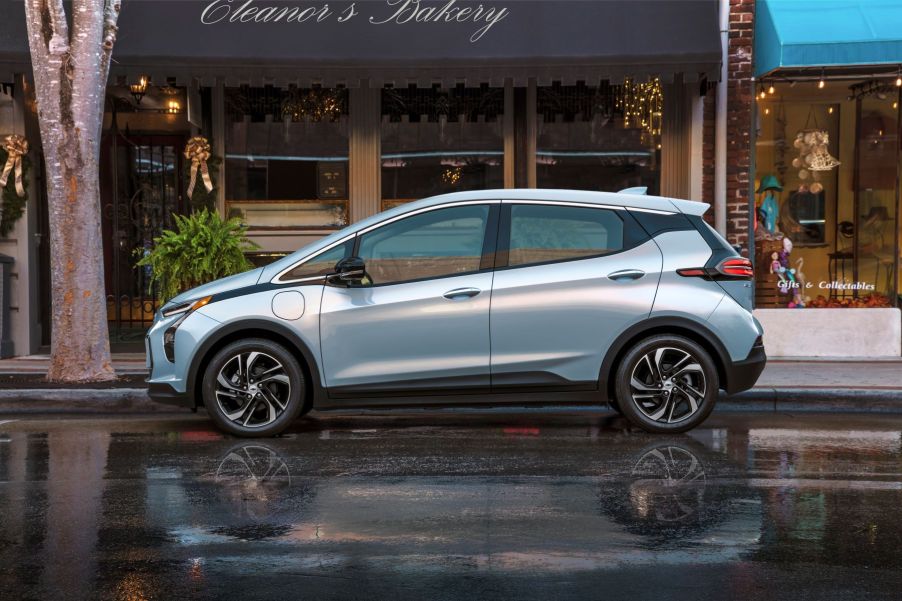
GM Announces Recall for Every Chevy Bolt Ever Made
The Chevy Bolt is one of the most popular, affordable electric vehicles on the market. However, it’s unfortunate battery fire issue is causing General Motors many headaches lately. According to Ars Technica, the Bolt’s problem is due to faults with the LG batteries that the EVs run on. So, what’s all going on with the Chevy Bolt, and what can you do if you own one?
GM is no stranger to massive recalls

General Motors has been in the spotlight before for recalls, some of them being rather large. It wasn’t long ago that the automaker dealt with seat belt and suspension problems, which triggered a recall for 840,000 vehicles. The seat belt brackets weren’t properly secured in some of its cars and trucks, and the rear toe links in the suspension had a problem of chipping and rusting over time.
In 2014, GM had to recall around 8.4 million vehicles due to ignition key rotation issues and faulty ignition switches. It was their largest recall problem of that year, and it spanned across many brands but mostly affected Chevrolet, Pontiac, and Oldsmobile.
This year, however, is another large one that will cost them tons more than previously expected. It started with a recall of the Chevy Bolt’s battery for the 2017 to 2019 models, which the automaker felt was a software issue at the time. The fix failed, and GM had to put out two more recalls since then to fix the battery fire issue. It has cost them around $800 million so far, but since a 2020 model went up in flames recently, the automaker extended the recall for all Bolt models up to the 2022 model year.
The added cost is expected to cost General Motors another $1 billion. According to The Verge, GM plans to seek reimbursement from LG, the makers of the defective batteries.
What exactly is the problem with the Chevy Bolt?
Upon investigation, GM determined the issue stems from torn anode tabs and folded separators in the cells of the affected batteries. Originally, officials felt the batteries were coming from one particular factory but have since found that multiple battery manufacturing plants are involved.
The defects in the batteries are causing the Chevy Bolt models to break out in fires. However, the affected vehicles were never in an accident that would cause the battery to go up in flames. Instead, Bolt models are catching fire while sitting in a garage or parked on a driveway.
GM wasn’t the only automaker affected by LG’s product. Hyundai had problems earlier with its Kona line but has since switched battery manufacturers. GM, however, is partnering with LG to develop battery plants here, in the U.S. Battery units from LG are planned for future electric vehicles, such as the Hummer EV.
What should you do if you have a Chevy Bolt EV?
If your Chevy Bolt model falls in the 2017 to 2022 model years, you’re going to have to wait for a replacement. General Motors and LG Chem are diligently working on building batteries to replace the defective ones. Unfortunately, it will take some time. These two companies don’t want to rush it to ensure they produce a safe replacement unit.
In the meantime, GM asks those with Bolt models not to charge their vehicles over the 90 percent range. The company also requests that owners not let the vehicle’s battery get under the 70-mile remaining range mark. Both of these situations could cause fire issues, so it’s best to avoid them when you can.
The other tips GM offers include not leaving the vehicle to charge overnight, especially when it’s in a garage next to your home. Keep the Chevy Bolt on a driveway when it’s not being charged until a replacement is completed.
If you own a vehicle affected by the recall, you will be notified when replacements are available and when and where you can set up an appt to have it fixed. If you don’t hear from General Motors when replacement batteries are made available, be sure to contact your local GM dealer to let them know you have a Chevy Bolt included in the model ranges given. After that, follow any instructions given by the service department.


